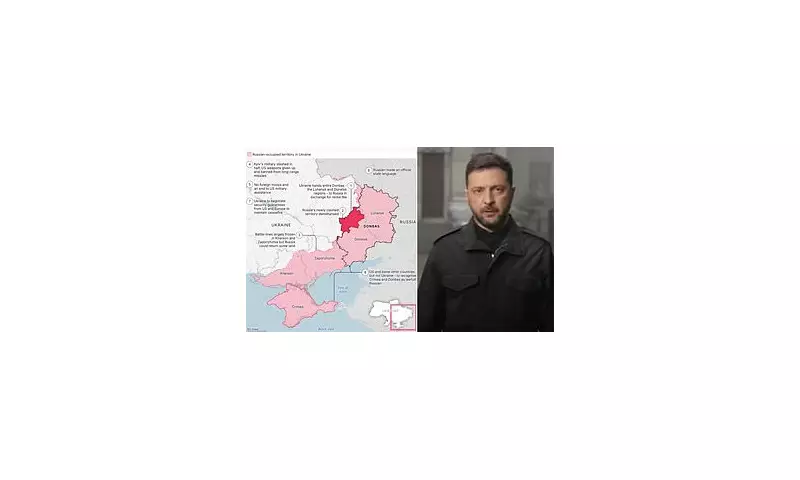
Ukraine's Critical Moment as US Presents Controversial Peace Terms
Ukrainian President Volodymyr Zelensky has made a solemn pledge not to betray his nation's sovereignty amid mounting pressure from the United States to accept a controversial peace deal with Russia. In a sombre video address delivered on Friday, the wartime leader described this as one of the most perilous moments in Ukraine's modern history, facing what he characterised as an impossible choice between national dignity and maintaining a crucial international partnership.
The 28-point peace proposal, backed by the Trump administration, would require Ukraine to make significant concessions including surrendering additional territory, reducing its military forces by nearly half, and holding elections within 100 days. President Donald Trump has demanded a response from Kyiv by Thursday, though sources suggest an extension for finalising the deal remains possible.
The Contentious Peace Terms
According to documents obtained from the proposed agreement, the plan contains several provisions that align closely with Moscow's longstanding demands. Crimea, Luhansk, and Donetsk would be recognised as de facto Russian territory, while the frontline in Kherson and Zaporizhzhia would be frozen at current positions. Ukraine would be required to withdraw from remaining areas of Donetsk Oblast under its control, creating a demilitarised buffer zone.
The military restrictions prove particularly severe, mandating that Ukraine reduce its armed forces from over 900,000 to just 600,000 personnel. Furthermore, Kyiv would need to constitutionally enshrine its non-accession to NATO, with the alliance similarly amending its statutes to permanently exclude Ukrainian membership. The country would also be prohibited from possessing long-range missiles capable of reaching Russian cities like Moscow or St Petersburg.
Other notable provisions include:
- Russia's reintegration into the global economy and invitation to rejoin the G8
- Lifting of international sanctions against Moscow
- $100 billion in frozen Russian assets directed toward US-led reconstruction efforts in Ukraine
- European commitment of an additional $100 billion for rebuilding
- Elections in Ukraine within 100 days of agreement
International Reaction and Diplomatic Manoeuvring
European leaders have responded with cautious concern to the proposed agreement. German Chancellor Friedrich Merz, French President Emmanuel Macron, and British Prime Minister Sir Keir Starmer held a joint call with President Zelensky, assuring him of their continued support for Ukrainian sovereignty. However, their statements carefully avoided direct criticism of the Trump administration's efforts.
European Commission President Ursula von der Leyen emphasised that nothing should be decided about Ukraine without Ukraine's involvement, while French Foreign Minister Jean-Noel Barrot stated plainly that peace cannot be a capitulation. The European Union had not been formally consulted on the peace efforts, according to officials familiar with the matter.
Meanwhile, Ukrainian officials expressed astonishment at the proposal's terms, with one source describing the feeling as f***ing mind blown has become our norm after Trump threatened to cut essential support if Kyiv rejected the framework.
Zelensky's Determined Response
Facing what he described as one of the heaviest pressure campaigns against Ukraine since the full-scale invasion began in February 2022, President Zelensky struck a defiant yet measured tone. We did not betray Ukraine then, we will not do so now, he declared, recalling the nation's initial resistance to Russian aggression.
The Ukrainian leader acknowledged he would work with American officials on the proposal but promised to present alternatives and arguments against provisions that violate Kyiv's red lines. He warned citizens to remain united against what he characterised as additional Russian attempts to derail peace efforts.
Rustem Umerov, Ukraine's security council chief and lead negotiator, reinforced this position on social media, stating unequivocally that there can be no decisions outside the framework of our sovereignty, the security of our people, or our red lines - now or ever.
Battlefield Realities and Domestic Challenges
The peace proposal emerges amid difficult military circumstances for Ukraine. Russian forces continue to grind forward on the battlefield while pounding Ukraine's energy infrastructure with missile and drone attacks. A recent assault on Zaporizhzhia killed five people, following another attack in western Ukraine that claimed at least 26 lives, including three children.
Compounding these challenges, Ukraine faces a severe manpower crisis with record desertion rates and a sprawling corruption scandal that has engulfed the energy sector and led to the dismissal of multiple government ministers. These domestic troubles have diverted attention from the war effort at a critical juncture.
With the Thursday deadline looming and a potential meeting between Zelensky and Trump in the coming days, the Ukrainian president must navigate what he described as the choice between losing dignity or risk losing a major partner. As he prepares his response, Zelensky has committed to pursuing what he calls a dignified peace that preserves Ukrainian sovereignty, even as the pressure intensifies from Washington.





